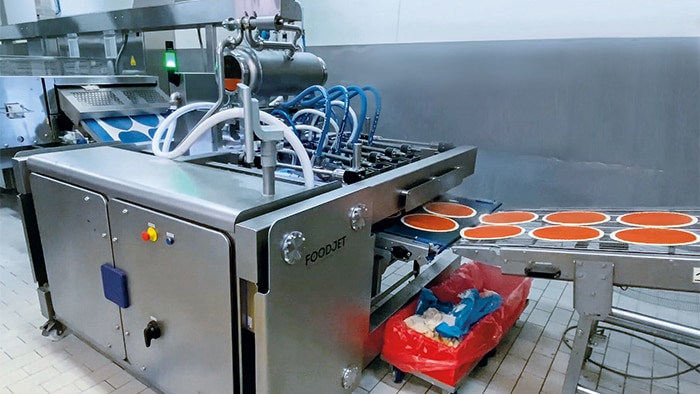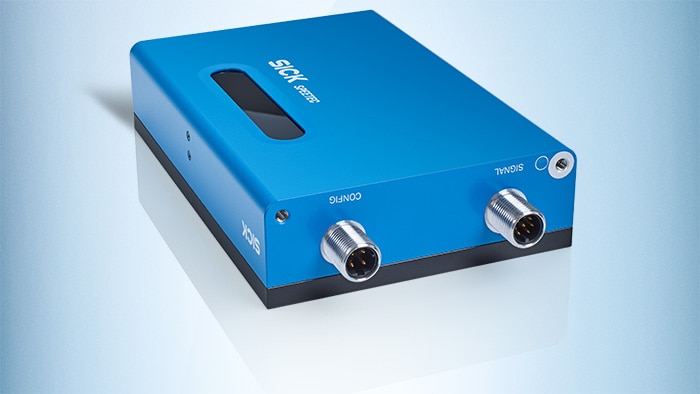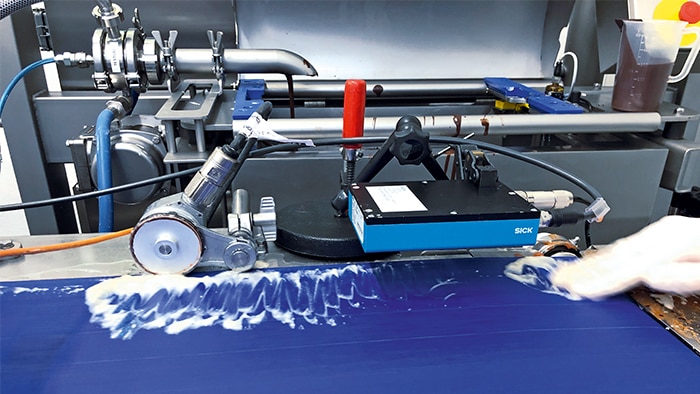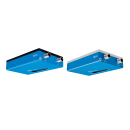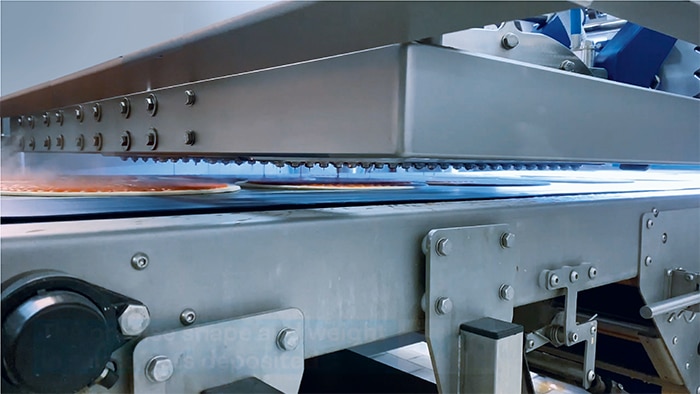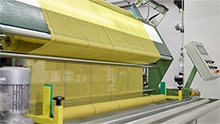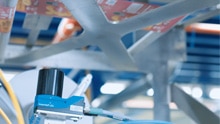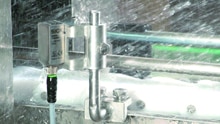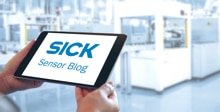Applying the right amount of tomato sauce or a perfect rim of jam on a cookie – this is a job for FoodJet, the specialist for precision pouring. Together with SICK and the SPEETEC 1D non-contact laser surface motion sensor, Foodjet is offering precision dosing and filling of foodstuffs, setting new standards for its customers.
Topping the pizza the right way: FoodJet uses non-contact measurement for its high-end pouring machine
In 2019, FoodJet had started to make its first contacts with big players in the food industry. Now, it is the other way around: It is the corporations that want to make appointments in Nijmegen in the Netherlands. “Our patented FoodJet technology for depositing viscous fluids is the only thing of its kind on the market,” says mechatronics engineer Emiel Gerrits from the research department. Together with his colleagues, he works on new innovations every day. Technology from SICK also plays an important role here.
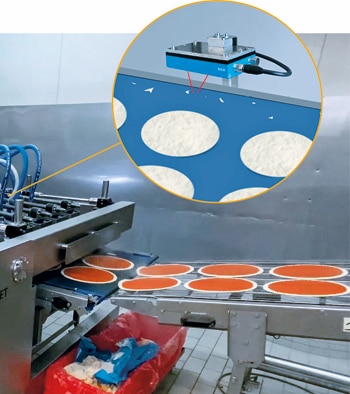
Correctly applying chocolate
“With our solutions for precision molding, we cover three different functions: graphic decoration as well as the filling of surfaces and cavities. For example, chocolate lines and figures are applied better than would be possible by hand, meaning manufacturers can work more efficiently. We also offer a product for wafers. Since the machine pours some chocolate into each indentation of the wafer, the product can be sold for a higher price,” is how Gerrits describes the portfolio of FoodJet.
The company is especially successful with its solutions for filling surfaces. Gerrits explains: “Our machines can put a layer of tomato sauce on a pizza or crème fraîche on a tarte flambée, for example. When doing so, they precisely follow the shape of the respective dough. This makes it possible to fill the dough perfectly all the way to the edge.”
Accurate down to half a centimeter: Jam on a cookie
The employees of Nijmegen are happy about their success, but without overestimating it. They have long been working on new applications. “We have gained a lot of experience with foodstuffs with different viscosities. We can now also work with pesto, garlic butter and even jam, for example. No one can measure jam to within half a centimeter of a cookie edge as precisely as we can,” Gerrits explains with pride. FoodJet is also setting new standards in machine design. “One example is pressure control of our print heads. We are constantly improving this to increase the weight accuracy per drop and per application. This is how we achieve considerable cost savings for our customers,” says Gerrits.
Flexibility when changing from one conveyor belt to the next
The developers at FoodJet are also working on making the machines capable of being used for a wider range of applications. “With our mobile Depositor Large, we give our customers the option of printing foods on different conveyor belts. The only disadvantage is that the customer has to reset the encoder that transmits the speed of the conveyor belt every time,” is how Gerrits describes the challenge and adds: “Of course, you can assemble a separate encoder on each conveyor belt. But then a connection has to be made for each one. That’s why we checked whether a non-contact motion sensor could be used for our high-end pouring machine. We wanted to fulfill the requirements of customers who want even more flexibility when changing from one conveyor to the next.”
Successful development project with SICK
A non-contact motion sensor also works more accurately. “With the laser, we actually measure on the object whose motion we want to detect. With an encoder on the drive roller, for example, tire elasticity and slip have to be taken into account,” explains Gerrits.
As part of the development project, Gerrits got to know the SPEETEC from SICK as well as the non-contact motion sensor from another supplier: “Both performed their main function well, but compared to the SPEETEC from SICK, the other product was significantly less practical. It needed more space, used a separate controller module and, due to the higher laser class, required shielding. With the SPEETEC, none of that matters. The solution from SICK was also three times cheaper. So the decision was an easy one to make.”
Support and consultation from SICK
In addition to the SPEETEC, other components from SICK are also used at FoodJet. “For instance, we still use programmable encoders from SICK in many places. Magnetic switches, temperature, level, pressure and fork sensors from SICK can also be found in our products,” says Emiel Gerrits.
FoodJet is very satisfied with the support and service from SICK in the Netherlands: “As engineers, we like to get advice from SICK. If something doesn’t go according to plan, SICK takes care of it right away. When we tried out the SPEETEC for the first time, they promised us direct support. But in the end, we were able to handle the product well ourselves,” says the mechatronics engineer and adds: “We work here with a young team of dedicated engineers who not only suggest improvements, but also put them into practice. When we come up with a new idea, we test it ourselves. That’s how we make sure that everything we design for our customers also lives up to our own high standards.”
Read more
Making sure the length is right: contact-free measurement of textile webs
Label Checker quality control system checks for the presence of the use-by-date
Hygienic Sensor Solutions: Stainless steel makes processes safer
